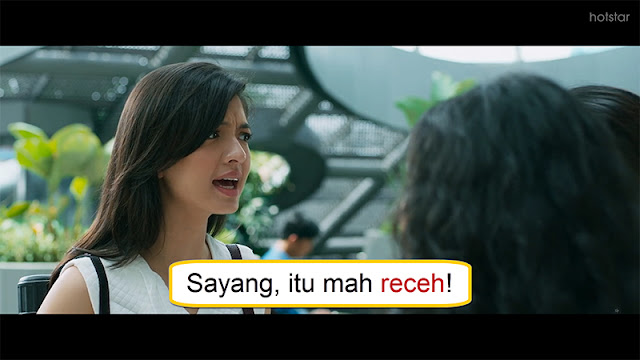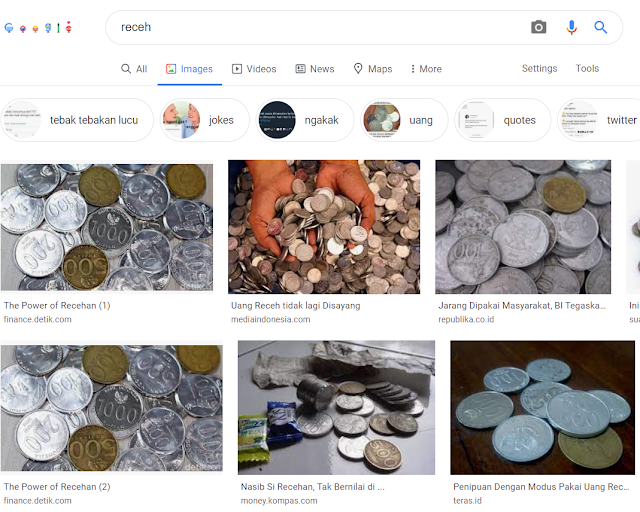- Get link
- X
- Other Apps
Posted by
Iman Prabawa
on
- Get link
- X
- Other Apps
Halo semuanya? Apa kabar? Ketemu lagi dengan saya, Iman Prabawa. Today, I want to talk to you about the meaning of this slang term in the Indonesian language, that is [receh]. As always, we will watch scenes from movies where this word is spoken.
If you have any questions regarding the Indonesian language, you can ask me directly. You can see how to do that on my About Me page.
If you are a beginner in the Indonesian language, you can learn step by step with My Lesson Here.
So, without further ado. Let's get started!
Receh In the Indonesian Language
Receh, in literal meanin,g means the money in the form of coins of low value, but in Indonesia, not only for coins but also for a small amount of money in paper form.
If you type in [receh] in Google and see in the Images section, you will see pictures like these.
Loe ada uang receh ngga? Gue mau buat bayar parkir nih. (You have coins? I need to pay for the parking fees.)
But [receh] can also have a figurative meaning. Receh, in a figurative sense, means something that is not important.
An example sentence for this.
Ngapain sih masalah kaya ginian dibahas? Ini mah masalah receh kali! (Why are you discussing about this matter? This is really an unimportant matter!)
And one more example using the word [receh] that I found online is this picture below.
There you can see the sentence,
Jokes receh ala member JKT48. (Dad jokes from member of JKT48.)
[Jokes receh] here means jokes that are not important, but somehow can make you laugh. Maybe in English, it is like a dad joke.
Next, let's hear how to pronounce the word [receh].
How to Pronounce Receh
Let's hear how to pronounce [receh] down below.
Next, we're going to watch scenes from movies where this word [receh] is spoken.
Receh In Movie Scene
The first clip that we're about to watch is taken from a movie called Orang Kaya Baru. Let's watch the clip below.
Linda: Tik.. Tika!
Tika: Hai. (Hi.)
Linda: Lo sering ya hang out sama Risha dan kawan-kawannya? (You often hang out with Risha and her friends, don’t you?)
Tika: Iya. Kenapa? (Yes. Why’d you ask?)
Linda: Gue ngga mau ngebatesin ya. Elo mo gaul sama siapa aja. Tapi, mereka itu bad news! (I don’t want to limit with whom you should befriend, but you know what? They are no good for you.)
Tika: Gue bisa jaga diri. Sayang, itu mah receh! Okeh. Yuk! (I can take care of myself. Sweetie, it’s a no biggie. Okay. Let's go!)
In this scene, Tika has changed since she became a rich woman. She begins to make friends with girls who are also rich, but they have a bad attitude. Then, Linda, her friend, warned her not to befriend them, but Tika said that she could take care of herself and that they didn't have to worry about it because it's no big deal.
Vocabulary From the Scene
[Lo] is informal for [Anda] = you. For more about this, you can read my article here, Lo In the Indonesian Language.
[Sama] = with.
[Kawan-kawan] = friends.
[Kenapa] = why.
[Ngebatesin] is the colloquial form of [membatasi] = to limit.
[Gaul] = to socialize, mingle, interact.
[Mereka] = they.
[Jaga diri] = take care of oneself.
[Mah] has no meaning. It is just a filler word. Its function is just to emphasize.
So, by saying [itu mah receh], Tika wanted to convince her friend that what their friend is worried about is not a big deal.
I guess that's all for now. If I find another scene where this word [receh] is spoken, Insha Allah, I will update this article again. Thank you for reading this article, and bye now.
Location:
Jakarta, Indonesia
- Get link
- X
- Other Apps
Hello, I'm Iman Prabawa a.k.a Pak Guru Iman. I love to share about languages. My Instagram, @iman_prabawa



Comments
Post a Comment